Crypto News
US Court Appearance Scheduled For Do Kwon Amid Claims Of $40 Billion In Crypto Losses
Buckle up as Do Kwon’s court appearance looms, revealing potential fallout from $40 billion in crypto losses that could reshape the industry forever.

Do Kwon's upcoming court appearance in Manhattan marks a pivotal moment amid claims of $40 billion in losses from his collapsed cryptocurrency venture. Extradited from Montenegro, he faces serious charges including fraud and money laundering, with potential penalties totaling over 100 years in prison. Kwon has pleaded not guilty and will undergo a series of complex legal proceedings in the coming months. This case not only impacts Kwon but could significantly shape future cryptocurrency regulations and investor protections. If you're curious about the implications for the crypto market, there's much more to uncover about this unfolding situation.
Key Takeaways
- Do Kwon faces serious criminal fraud charges in U.S. federal court related to the TerraUSD and Luna collapse, with potential penalties exceeding 100 years.
- His extradition from Montenegro was prioritized by the U.S., following an INTERPOL Red Notice that marked him as a fugitive.
- Kwon misled investors about TerraUSD's stability, contributing to approximately $40 billion in financial losses after the collapse.
- A jury previously found Kwon liable for securities fraud, resulting in a $4.5 billion settlement imposed against him.
- The outcome of Kwon's trial could significantly impact future cryptocurrency regulations and investor protection measures in the U.S. market.
Court Appearance Overview

Do Kwon's recent court appearance marks a significant moment in the ongoing legal saga surrounding his cryptocurrency ventures. Scheduled for a Manhattan federal court hearing, this event follows his extradition to the U.S. and initial appearance before Magistrate Judge Robert W. Lehrburger on December 31, 2024. You should know that Kwon faces serious criminal fraud charges, including securities and wire fraud, stemming from the catastrophic collapse of TerraUSD and Luna in 2022, resulting in estimated investor losses of around $40 billion. Additionally, Kwon has already agreed to an $80 million civil fine(80 million civil fine) as part of a settlement with the SEC. During his first U.S. court appearance, Kwon pleaded not guilty, with his lawyer entering the plea on his behalf. This case could greatly impact future cryptocurrency regulations and investor protections, making it crucial for you to stay informed.
Extradition Details
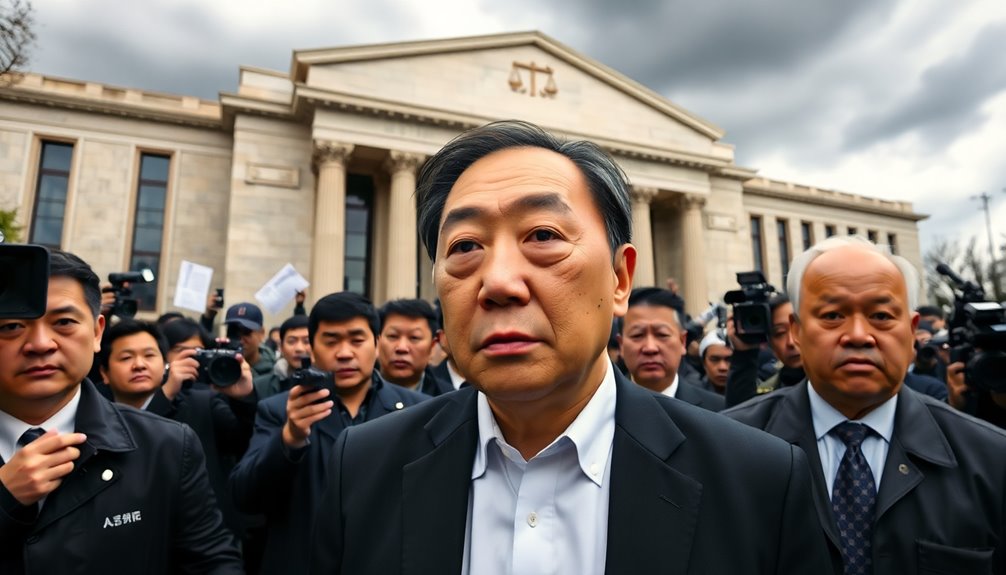
Kwon's extradition from Montenegro to the United States on December 31, 2024, marks a pivotal point in the legal proceedings against him.
The Montenegrin police facilitated this transfer at Podgorica International Airport after Justice Minister Bojan Bozovic signed the extradition order. Notably, this extradition occurred despite the lack of an extradition treaty between the US and Montenegro.
Both the US and South Korea sought Kwon's extradition, but Montenegro prioritized the US request. An INTERPOL Red Notice had marked him as a high-priority fugitive since September 2022, reflecting the international cooperation in pursuing crypto-related crimes. This case is particularly significant due to the $40 billion loss in market value associated with the TerraUSD collapse.
Kwon's earlier attempts to evade extradition using fake passports added to the complexities of his case and highlighted jurisdictional challenges.
Charges Against Do Kwon

The charges against Do Kwon encompass a range of serious allegations, reflecting the gravity of his actions in the crypto space. He faces two counts each of commodities fraud, securities fraud, and wire fraud, with potential maximum penalties totaling 60 years in prison.
Additionally, money laundering was recently added to the charges. Allegations include misleading investors about the stability of TerraUSD, falsely claiming innovative financial technologies, and using deceptive tactics to manipulate stakeholders. The indictment was unsealed before his US court appearance, where not guilty pleas were entered. A jury found Kwon and Terraform Labs liable for securities fraud, resulting in a $4.5 billion settlement and a ban on future cryptocurrency transactions. This case follows the $40 billion crash related to Terraform Labs, which has raised significant concerns among global investors.
Financial Fallout Analysis
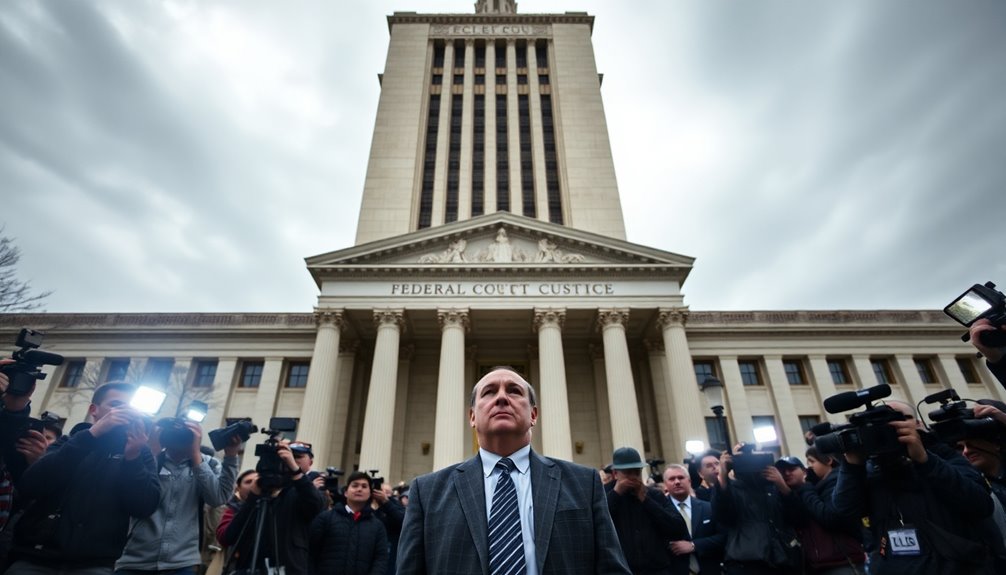
Many investors found themselves grappling with significant financial losses following the collapse of TerraUSD and Luna.
You've likely noticed the staggering $40 billion wiped from the cryptocurrency market, with many global investors feeling the brunt of the fallout.
The de-pegging of TerraUSD from its intended $1 value misled you and others about its stability and technology. The fallout from this collapse led to the legal troubles of its founder, Do Kwon, who now faces multiple charges including fraud.
This collapse didn't just impact Terra; it sent shockwaves through the broader crypto market, dragging down established assets like Bitcoin.
Panic-driven withdrawals of UST contributed to this instability, leading to closures of other cryptocurrency firms.
With such widespread financial harm, the implications for investors are clear: trust in the cryptocurrency market has been severely shaken, raising concerns about future investments.
Legal Proceedings Update

As the dust settles from the financial fallout of TerraUSD and Luna, attention now turns to the legal proceedings surrounding Do Kwon. He faces serious charges, including securities fraud, wire fraud, money laundering, and commodities fraud.
An updated indictment on January 1, 2025, added a conspiracy to commit money laundering charge. Kwon made his first U.S. court appearance on January 2, 2025, where he pleaded not guilty to all counts, only acknowledging his understanding of English. This case draws significant media attention due to the 2022 crypto market crash, as it could significantly impact cryptocurrency regulation. If convicted on all charges, Kwon faces a potential sentence of over 100 years in prison, making the stakes incredibly high for him and the crypto industry at large.
Key Misrepresentations Identified

Numerous key misrepresentations have surfaced in the case against Do Kwon, revealing a web of deceit surrounding TerraUSD and its ecosystem.
You might be surprised to learn that TerraUSD was falsely promoted as a stablecoin, claiming to be pegged to fiat currencies while relying on a flawed decentralized protocol.
Investors were misled about the relationship between UST and the Chai payment app, which didn't even utilize the Terra blockchain as advertised.
Furthermore, the Genesis Stablecoins were misrepresented, with their true purpose hidden from investors.
These coins were used for fraudulent activities and price manipulation, ultimately resulting in a significant collapse that cost investors around $40 billion.
The entire system was built on deceptive practices, undermining trust in the cryptocurrency market. Additionally, Kwon is facing charges of conspiracy, commodities, securities, and wire fraud as part of the indictment.
Potential Legal Consequences

Do Kwon's legal troubles are stacking up, and the potential consequences could be severe.
Facing multiple charges, including securities and commodities fraud, he could receive a hefty prison sentence. If convicted in the U.S., he might face up to 40 years behind bars.
Should he be extradited to South Korea and convicted there, that adds another possible 40-year sentence. Significant fines and restitution could also be imposed for the staggering $40 billion in losses attributed to his actions.
Currently detained in federal jail, the seriousness of the charges suggests that the court could impose an extended imprisonment. The allegations of misleading investors regarding TerraUSD's pegged value highlight the gravity of his situation.
The legal proceedings are just beginning, and the future looks precarious for Kwon.
Implications for Cryptocurrency Industry
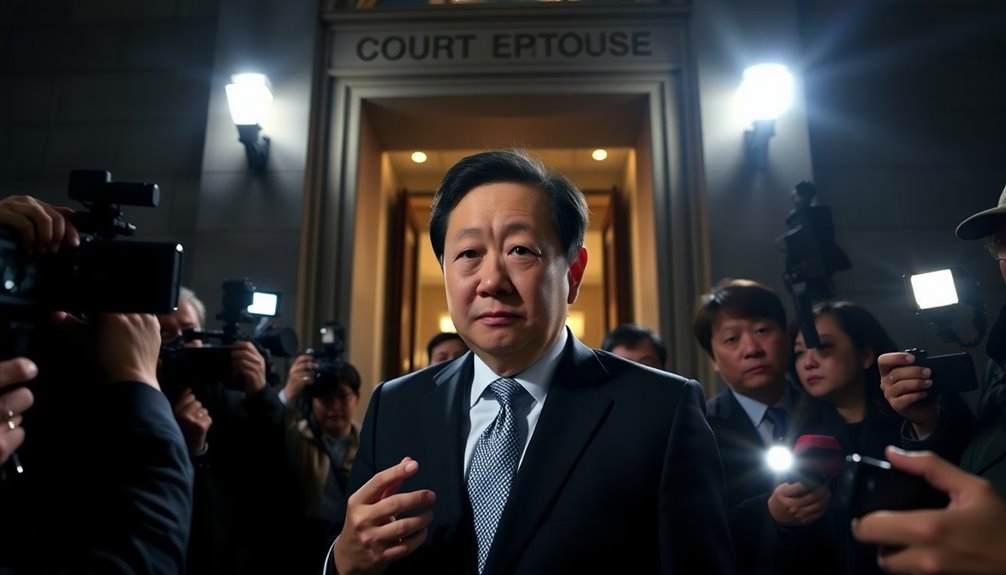
The legal proceedings surrounding Do Kwon's case are set to have significant implications for the cryptocurrency industry.
As existing laws may be applied more broadly, you might see the SEC's position strengthen, leading to better-defined regulations. Increased scrutiny could foster greater accountability and investor protection, reshaping how various cryptocurrencies are regulated.
Moreover, this case underscores the need for transparency, particularly highlighted by the collapse of TerraUSD. The total estimated loss from the collapse is a stark reminder of the potential risks involved in the crypto market.
You may notice a shift toward more traditional stablecoin models, as authorities rethink the approach to algorithmic options.
Ultimately, these developments could enhance market confidence, ensuring that similar frauds become less likely and fostering a safer investing environment for everyone involved.
Future Court Dates and Expectations
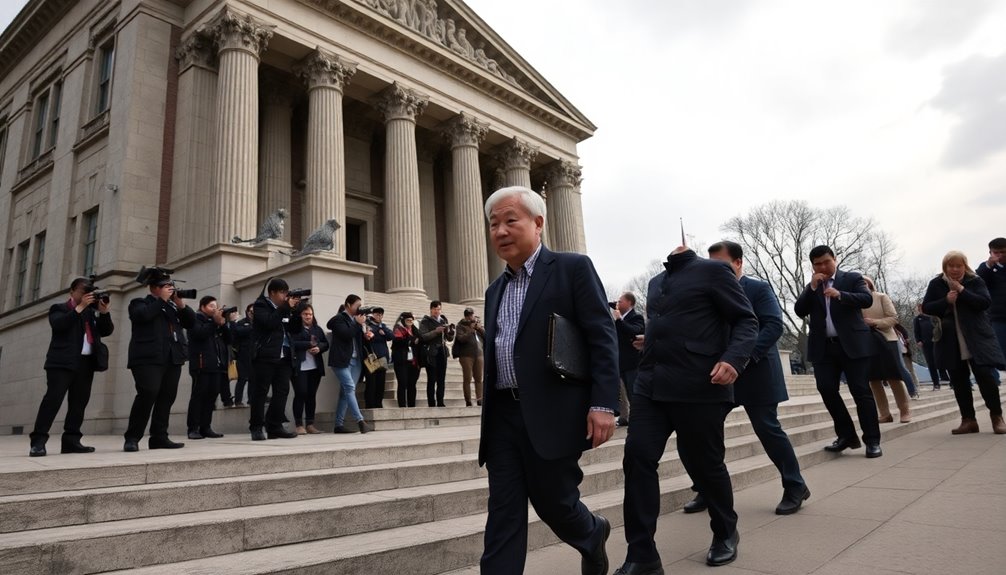
While no specific court dates have been set yet, ongoing legal proceedings against Do Kwon are expected to unfold over the coming months. The complexities of the case, involving charges like securities fraud and money laundering, suggest that future hearings will be numerous and detailed. With the extradition process concluded, the court will now address various allegations stemming from activities between 2018 and 2022. Depending on the evidence presented, the court's decisions could significantly impact Kwon's future, potentially leading to lengthy prison sentences if he's convicted. His defense team must effectively counter the prosecution's claims, arguing that market dynamics, not fraud, caused the collapse, adding further intrigue to the upcoming legal battles. The outcome of this trial could shape the future of cryptocurrency regulations in the US, as authorities respond to high-profile cases like Kwon's.
Frequently Asked Questions
What Led to Do Kwon's Arrest in Montenegro?
Do Kwon's arrest in Montenegro stemmed from his attempt to flee to Dubai using a fake passport.
When authorities detained him at Podgorica airport on March 23, 2023, he was traveling with his business partner, Chang Joon.
Following his arrest, he faced charges of forgery and received a four-month prison sentence.
This set the stage for extradition requests from both U.S. and South Korean authorities.
How Does This Case Affect Investor Confidence in Cryptocurrency?
This case seriously undermines your confidence in cryptocurrency.
With reports of fraud and significant financial losses, it's no wonder that many investors like you feel uneasy.
You're likely to scrutinize investment opportunities more closely, seeking assurances of safety.
As risk perception rises, you might lean towards more traditional investments, fearing market volatility.
What Is the Timeline for the Trial Proceedings?
You can expect the trial proceedings to unfold in several key stages.
Following Do Kwon's initial court appearance, a follow-up conference is set for January 8, 2025.
During the trial, witness testimonies and evidence will be presented to establish Kwon's guilt or innocence.
He'll remain in custody without bail until the trial concludes.
These proceedings are crucial for understanding the case's implications on the broader cryptocurrency landscape.
Are There Any Potential Plea Deals for Do Kwon?
You're right to wonder about potential plea deals for Do Kwon. Currently, there's no sign of a plea deal being in place.
His defense might lean towards a trial instead, especially since previous SEC settlements won't shield him from criminal charges.
Keep an eye on the upcoming status conference; it could reveal more about his defense strategy and whether negotiations for a plea deal might emerge in the future.
How Can Investors Recover Losses From the Collapse?
If you're looking to recover losses from a cryptocurrency collapse, start by documenting everything related to your investments.
Engage with legal experts who specialize in crypto asset recovery and consider using blockchain analytic tools to trace your assets.
Report the incident to law enforcement and collaborate with cybersecurity professionals to understand any breaches.
Additionally, participate in forums for community support and advice on recovery strategies that might help you regain some of your losses.
Conclusion
As Do Kwon's court appearance approaches, the cryptocurrency world watches closely. The claims of staggering losses highlight the risks inherent in this volatile market. With potential legal consequences looming, it's crucial to stay informed about how this case unfolds. The implications for the industry could be significant, shaping regulations and investor confidence for years to come. Keep an eye on future court dates—they might redefine the landscape of cryptocurrency as we know it.
Thorsten has been immersed in the cryptocurrency world for several years. His early experiences as a miner and active market participant have given him first-hand knowledge of the industry’s highs and lows. Thorsten’s approach is grounded in transparency and honesty, ensuring our editorial direction remains authentic, accurate, and reader-focused.
Crypto News
Coalition Of Tether, Tron, TRM Labs Takes Action Against Crypto Crime, Freezing Over $100M
Get insights into how the coalition of Tether, TRON, and TRM Labs is tackling crypto crime by freezing over $100 million in suspicious assets.

The coalition of Tether, TRON, and TRM Labs is taking a bold stand against crypto crime by freezing over $100 million in assets connected to illegal activities. Formed in August 2024, this innovative financial crime unit collaborates with law enforcement across five continents. Utilizing blockchain intelligence, they pinpoint transactions tied to terrorism and cybercrime. By proactively monitoring for scams and implementing compliance measures, the coalition aims to strengthen the crypto ecosystem. Their actions highlight the importance of public-private partnerships in combating financial crime, and there's much more on how this shapes the future of digital finance.
Key Takeaways
- The T3 Financial Crime Unit, formed in August 2024, targets illicit USDT usage on the TRON blockchain.
- Over $100 million in Tether's USDT has been frozen due to various illicit activities.
- The coalition employs TRM Labs' blockchain intelligence to detect terrorism and cybercrime-related transactions.
- Successful actions have led to freezing over $12 million linked to scams and illicit trades.
- The initiative emphasizes regulatory compliance, public awareness, and education within the crypto community.
Formation and Collaboration

In August 2024, the T3 Financial Crime Unit was formed to tackle the illicit use of USDT on the TRON blockchain.
This unique collaboration among Tether, TRON, and TRM Labs represents the first private sector financial crime unit aimed at addressing blockchain-related crime.
You'll find that the unit not only focuses on combating financial crime but also collaborates with law enforcement agencies across five continents.
By sharing intelligence and simplifying cross-border cooperation, they enhance the effectiveness of investigations into illegal activities. Notably, the unit has already successfully frozen over $100 million in Tether's USDT linked to illicit activities.
Each member brings vital expertise: TRON supports the network, Tether contributes to investigations, and TRM Labs provides advanced analytics.
Together, they're committed to maintaining the integrity of the financial ecosystem while disrupting criminal operations.
Scope of Operations

The scope of operations for the T3 Financial Crime Unit is extensive and multifaceted, designed to combat a wide range of illicit activities in the cryptocurrency space.
You'll see them utilizing blockchain intelligence from TRM Labs to detect transactions linked to crimes like terrorism and cybercrime. Their global network of expert investigators generates vital intelligence, supporting law enforcement in real-time. Additionally, the unit has successfully frozen over USDT $12 million linked to various scams, underscoring its commitment to disrupting criminal operations.
They implement transaction monitoring tools to swiftly address high-priority incidents and employ advanced data analysis to trace fund flows.
By collaborating with law enforcement globally, they share critical information and engage in joint investigations.
They also focus on regulatory compliance, public awareness, and education, ensuring that both the crypto community and authorities are equipped to tackle emerging threats effectively.
Frozen Assets Overview
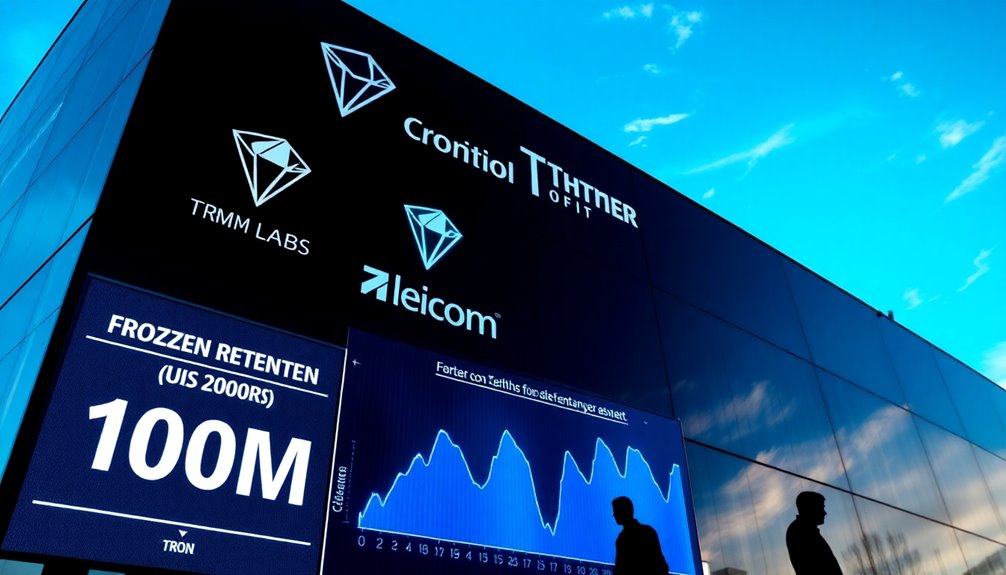
Understanding frozen assets is key when examining the broader landscape of cryptocurrency-related crimes. Frozen crypto represents a temporary suspension of access to specific funds, often due to legal issues, security concerns, or compliance matters. During this freeze, the associated private keys or smart contracts are locked, preventing any transactions until the freeze is lifted.
Common reasons for freezing assets include ongoing investigations into fraud or money laundering, security breaches to protect user funds, and compliance with regulations. Centralized platforms can enforce these freezes, sometimes requiring a court order. Additionally, certain tokens possess features that allow developers to implement freezes or blacklist specific addresses, ensuring greater security and regulatory adherence in the crypto space. This approach highlights the importance of frozen crypto as a mechanism for maintaining order within the evolving digital financial ecosystem.
Types of Financial Crimes

As financial crimes evolve, they increasingly exploit the unique features of cryptocurrency, making it essential to recognize the various types that pose significant risks.
Money laundering often employs crypto mixers and decentralized finance (DeFi) platforms to hide transaction origins, with daily average theft from DeFi protocols exceeding $7.6 million(daily average theft from DeFi protocols).
Cybercrime, particularly ransomware attacks, demands payments in crypto, allowing hackers to target critical infrastructure.
Consumer scams, like Ponzi schemes and fake exchanges, use social engineering to lure victims into losing billions.
Additionally, darknet marketplaces facilitate illicit trade in drugs, stolen data, and weapons, thriving on anonymous cryptocurrency transactions.
Each of these financial crimes not only endangers individual investors but also jeopardizes the integrity of the entire crypto ecosystem, highlighting the need for vigilant countermeasures.
Regulatory and Legal Context

Navigating the regulatory and legal context of cryptocurrency can feel overwhelming, especially with the rapid evolution of rules and standards across the globe.
You'll notice a global framework emphasizing 'same activity, same risk, same regulation,' targeting crypto-assets and stablecoins while excluding CBDCs. FSB's framework aims for consistent and comprehensive regulation to address the vulnerabilities highlighted in the past year.
Various regulatory bodies play distinct roles; the SEC protects investors, the CFTC tackles fraud in derivatives, and the DoJ focuses on criminal activities.
The U.S. and EU are actively working to streamline regulations, like the Markets in Crypto-assets Regulation (MiCA).
Additionally, specific measures, including anti-money laundering laws and IT security requirements, aim to enhance market integrity and consumer protections.
Impact of the Coalition

How has the Coalition Against Crypto Crime reshaped the landscape of digital asset security?
The Coalition's swift action in freezing over $100 million in USDT assets showcases its effectiveness in combating criminal activity. Its international reach, spanning five continents, highlights the importance of global cooperation in tackling money laundering, investment fraud, and other serious crimes. The Coalition's efforts align with the growing recognition that complex schemes used in cryptocurrency laundering necessitate innovative solutions.
By analyzing millions of transactions in real-time, the Coalition disrupts criminal operations and sends a strong deterrent message. Furthermore, its collaboration with law enforcement enhances security and transparency, setting new standards in the crypto space.
The proactive monitoring and continuous engagement with authorities not only bolster the integrity of the financial ecosystem but also demonstrate the transformative power of public-private partnerships in ensuring a safer crypto environment.
Future Directions in Crypto Security

The advancements in digital asset security are paving the way for a more resilient future, building on the foundation laid by the Coalition Against Crypto Crime. You'll see post-quantum cryptography emerging to defend against quantum computing threats, ensuring your assets remain secure. Advanced encryption methods like homomorphic encryption allow computations on encrypted data, preserving privacy without compromising security. The implementation of robust cryptographic algorithms will be essential in countering emerging threats and maintaining the integrity of digital transactions. Additionally, AI security solutions will enhance threat detection and automate incident responses, keeping you a step ahead of cyber threats. Furthermore, decentralized security protocols will reduce single points of failure, bolstering overall network resilience.
Importance of Public-Private Partnerships

Public-private partnerships play a crucial role in combating financial crimes, especially in the rapidly evolving landscape of crypto assets. By facilitating information sharing, these collaborations enhance understanding of financial crimes and improve investigations. You'll see how combining transactional data with law enforcement intelligence leads to better identification and prevention of illicit activities. This proactive approach enables early detection of threats, allowing targeted interventions for high-risk transactions. Furthermore, these partnerships support the development of effective regulatory frameworks that enhance compliance with AML/CFT regulations. Ultimately, they foster innovation, build trust among stakeholders, and contribute to a global impact, promoting transparency and good governance in financial systems. Formal Partnerships are essential for strategic intelligence sharing and addressing complex financial crime challenges. Together, these efforts create a more secure environment for everyone involved in the crypto space.
Frequently Asked Questions
How Can Individuals Report Suspected Crypto-Related Crimes?
If you suspect crypto-related crimes, you can report them to the FBI's Internet Crime Complaint Center (IC3) or the Federal Trade Commission (FTC).
Gather essential details like cryptocurrency addresses, transaction hashes, and any communication with the scammer.
Local law enforcement agencies and Chainabuse.com are also good options.
After filing your complaint, keep a record of it and be cautious of recovery services that ask for upfront fees.
What Measures Protect User Privacy During Investigations?
During investigations, various measures can protect your privacy. Techniques like ring signatures and stealth addresses obscure sender identities and transaction amounts.
Tools such as Wasabi and Samourai wallets enhance anonymity by mixing transactions. Using VPNs and Tor can hide your IP address during online activities.
While regulatory compliance pressures exist, innovations like zero-knowledge proofs help maintain your privacy while still allowing for transaction verification, striking a balance between personal security and transparency.
How Does This Coalition Affect Legitimate Cryptocurrency Users?
This coalition enhances the security of the cryptocurrency environment, ultimately benefiting you as a legitimate user.
By targeting illicit activities, it promotes a safer space for transactions, boosting your trust in the system. You'll likely see improved transparency, making it easier to trace funds.
However, be aware that some temporary account freezes might occur, which could affect your access if flagged erroneously.
Are There Penalties for Crypto Exchanges That Don't Comply?
Yes, there are significant penalties for crypto exchanges that don't comply with regulations. You might see steep fines, as seen with Binance, which agreed to pay billions for violations.
Criminal liability can also arise, leading to serious consequences for executives. Additionally, exchanges may face restrictions on operations, mandated monitoring, and even the shutdown of their platforms.
It's crucial for exchanges to adhere to regulations to avoid these harsh penalties and maintain user trust.
What Technologies Are Used to Analyze Blockchain Transactions?
To analyze blockchain transactions, you'll use a variety of technologies.
Blockchain explorers and APIs enable you to extract raw data from networks. Once collected, you clean and structure this data using parsing techniques.
Machine learning algorithms help assess transaction risks and visualize trends. You can apply address clustering to group entities and use advanced visualization tools to detect suspicious patterns and flows, making complex data comprehensible and actionable for investigations.
Conclusion
In conclusion, the coalition of Tether, Tron, and TRM Labs is making significant strides in combating crypto crime by freezing over $100 million in assets. This collaborative effort highlights the importance of addressing financial crimes in the evolving digital landscape. As they continue to strengthen public-private partnerships, you can expect more robust security measures and regulatory frameworks to emerge. Together, we can foster a safer environment for everyone involved in the cryptocurrency ecosystem.
Thorsten has been immersed in the cryptocurrency world for several years. His early experiences as a miner and active market participant have given him first-hand knowledge of the industry’s highs and lows. Thorsten’s approach is grounded in transparency and honesty, ensuring our editorial direction remains authentic, accurate, and reader-focused.
Crypto News
Celsius Fights Back: Appeals Court Ruling Against $444M Claim on FTX Transfers
How will Celsius’s appeal against the $444 million ruling impact the future of creditor claims in the crypto industry? Discover the potential ramifications.
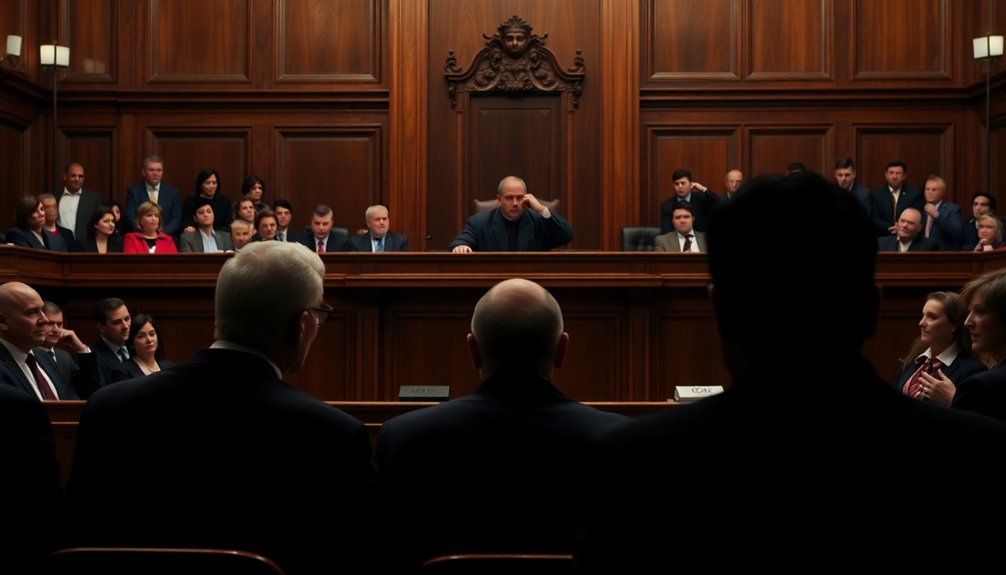
Celsius is fighting back after an appeals court dismissed its $444 million claim against FTX, citing procedural flaws. The judge found that Celsius filed an amended claim after the July 2024 bar date without proper approval, making its arguments irrelevant to the original allegations. Their initial claim sought $2 billion but was reduced to focus on preferential transfers. Now, Celsius has filed a Notice of Appeal, aiming to challenge the dismissal and protect its rights. The outcome of this case could reshape how creditor claims are handled in the evolving crypto landscape. Curious about the implications?
Key Takeaways
- Celsius's appeal challenges the court's dismissal of its $444 million claim against FTX due to procedural flaws.
- The original claim sought $2 billion for damages but was later reduced to focus on preferential transfers.
- Court dismissed amended claims for being unrelated to the original allegations and filed without approval.
- Legal experts are monitoring Celsius's appeal for compliance with necessary legal standards and potential impact on creditor claims.
- The case highlights broader instability in the crypto industry following the FTX collapse, leading to increased regulatory scrutiny.
Overview of the Court Ruling

Recently, the court ruled against Celsius in a significant case involving FTX transfers.
Judge John Dorsey dismissed both the initial and amended claims due to procedural flaws. The amended claim was filed after the July 2024 bar date without court approval, and its content didn't relate to the original claims.
The judge noted that allowing these claims could obstruct FTX's restructuring plans. Additionally, the court found that Celsius failed to provide sufficient evidence to support its allegations, particularly regarding "preferential transfers." This dismissal reflects the judge's emphasis on the potential obstruction of FTX's restructuring efforts.
The lack of detail in the claims was a critical factor in the dismissal. Celsius now faces the challenge of appealing this ruling while pursuing its goal of recovering funds for its creditors.
Details of the Original Claim

The original claim filed by Celsius sought an astonishing $2 billion in damages from FTX, based on allegations that FTX officials made "unsubstantiated and disparaging statements."
These statements purportedly harmed Celsius' reputation and contributed to its financial collapse in 2022. Celsius argued that FTX officers made false claims about its balance sheet and financial stability, which undermined investor confidence and the company's ability to operate.
The basis of the claim focused on reputational harm and the systemic damage these statements caused to Celsius' business. Eventually, the claim amount was reduced to $444 million, shifting the focus to "preferential transfers," but the initial allegations set the stage for the ongoing legal battle between Celsius and FTX. Additionally, the original proof of claim was deemed insufficient by the court, contributing to the dismissal of Celsius's claims.
Procedural Issues Highlighted

Numerous procedural issues have emerged during Celsius's legal battle against FTX, complicating their claims and weakening their position.
The initial filings lacked sufficient detail to support allegations of preferential transfers, with claims only briefly mentioning potential preferences without adequate evidence. The court deemed these claims too vague to proceed.
When Celsius filed amended claims after the deadline, they introduced new arguments unrelated to the original claims, failing to justify the delay. This disrupted FTX's reorganization efforts and asset distribution efforts.
Moreover, Celsius didn't seek court approval for these late amendments, rendering them procedurally improper. The court emphasized that such procedural deficiencies couldn't be overlooked, significantly undermining Celsius's efforts to recover the contested funds.
Appeal Process and Next Steps

Celsius has officially entered the appeal process following Judge John T. Dorsey's ruling.
On December 31, the company filed a Notice of Appeal in the District Court, signaling its intent to challenge the dismissal of its $444 million claim against FTX.
This move underscores Celsius' belief that its initial proofs of claim adequately notified FTX of the issues at hand. Legal experts will closely monitor whether these claims meet the necessary legal standards. The appeal process is crucial for Celsius to assert its rights and seek potential damages. As Celsius' claims relate to the alleged financial misconduct by FTX officers, stakeholders should stay updated, as the outcome could significantly impact creditor claims within the cryptocurrency bankruptcy landscape.
Allegations Against FTX Executives

Allegations against FTX executives reveal a troubling pattern of misconduct that has shaken the cryptocurrency industry. Misuse of customer funds is at the forefront, with billions diverted to Alameda Research for trading, luxury real estate, and political contributions. Executives designed code features that allowed Alameda to leverage customer assets, violating FTX's public claims of separation between the two entities. Additionally, FTX lacked proper governance and controls, leaving funds and sensitive data vulnerable. Notably, FTX's financial troubles became apparent when it filed for bankruptcy after failing to cover an $8 billion funding gap. Fraudulent schemes, including fake financial statements and inflated token valuations, masked severe financial issues. Sam Bankman-Fried and his associates now face serious legal repercussions, including fraud charges and potential prison time, while some executives have chosen to cooperate with authorities.
Broader Implications for Crypto
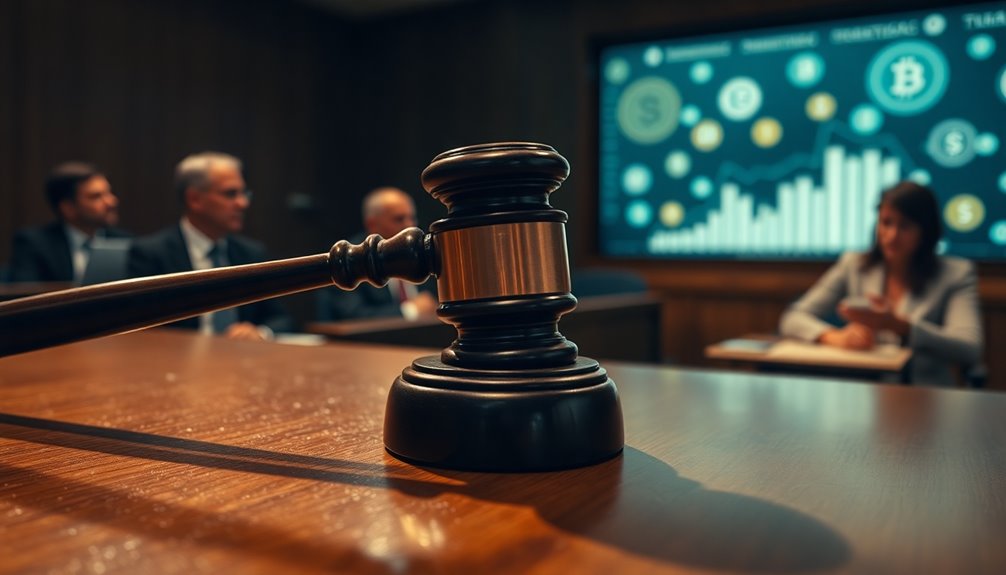
The collapse of FTX has sent shockwaves through the crypto industry, raising urgent questions about its stability and future.
You may have noticed a surge in customer withdrawals from various exchanges, reflecting a significant loss of trust across the market. While systemic financial institutions seem insulated, the fallout has led to many crypto lenders and exchanges downsizing or shutting down entirely. This situation underscores the urgent need for increased regulatory scrutiny. As cautious investors demand transparency and accountability, the industry must adapt. The incident has highlighted the importance of client deposits mismanaged, indicating that the landscape of crypto is poised for transformative changes.
Future exchanges will likely adopt stricter auditing and compliance practices to safeguard against similar failures. The incident has sparked vital discussions about client protection measures, indicating that the landscape of crypto is poised for transformative changes.
Importance of Procedural Compliance

Why is procedural compliance crucial for organizations navigating the turbulent waters of the crypto industry? It ensures you adhere to legal, regulatory, and internal standards, protecting your organization from risks like legal penalties or reputational damage.
By maintaining clear policies and training programs, you promote ethical conduct and uphold the organization's integrity. Regular audits help identify compliance issues, while well-defined roles clarify responsibilities. Regular evaluations based on evaluation criteria are essential for assessing compliance effectiveness and identifying areas for improvement. Additionally, adhering to compliance standards can enhance an organization's ability to leverage blockchain technology for operational improvements.
Compliance is also key to effective risk management, as it involves monitoring systems to address any concerns. Moreover, structured procedures enhance operational efficiency and transparency, allowing for fair treatment and systematic operations.
In a volatile industry, staying compliant isn't just important; it's essential for long-term success and sustainability.
Frequently Asked Questions
What Are the Potential Outcomes of the Appeal for Celsius?
The potential outcomes of the appeal for you could vary significantly.
If it's successful, you might recover $444 million, positively impacting your creditors and financial health.
However, if the appeal fails, you won't reclaim those funds, which could hinder your repayment efforts and affect your token's value.
Additionally, the appeal's outcome could set a precedent for future bankruptcy claims, influencing your legal strategies and those of similar companies in the crypto space.
How Will This Ruling Affect Celsius' Creditors?
This ruling could significantly impact your recovery as a Celsius creditor.
If the appeal goes against Celsius, it might delay the distribution of funds and complicate your claims process.
You may find that your eligibility for repayments changes, and the overall amount available could shrink, affecting your financial outcome.
The decisions made here will likely set a precedent that influences future claims and restructuring efforts in the cryptocurrency space, impacting your rights as a creditor.
What Is the Timeline for the Appeal Process?
The appeal process typically begins with the filing of the Notice of Appeal, which you've already seen happen.
After that, you can expect the appellant to prepare a brief outlining their arguments, usually within a few months.
The opposing party then submits their response.
Oral arguments may follow, and the court usually takes some time to deliberate before issuing a ruling.
Can Celsius File a New Claim After the Dismissal?
You can't simply file a new claim after a dismissal without addressing the reasons for the initial dismissal.
If the court found procedural flaws or insufficient evidence, you'll need to ensure your new claim resolves those issues.
You might consider gathering stronger evidence or clarifying your arguments.
Consult with your legal team to understand the best approach, as timing and compliance with court rules are crucial for any future claims.
How Does This Ruling Impact Other Cryptocurrency Companies?
This ruling sets a significant precedent for other cryptocurrency companies navigating bankruptcy.
You'll notice that it tightens the standards for filing claims, requiring clarity and timeliness to avoid dismissal.
As a result, companies in similar situations may face increased scrutiny and pressure to adhere strictly to procedural requirements.
This could lead to a more cautious approach in how they handle their financial practices, ultimately impacting their operations and relationships with creditors.
Conclusion
In conclusion, Celsius' appeal against the court ruling on the $444 million claim related to FTX transfers underscores the complexities of the crypto landscape. As they navigate the appeal process, the outcome could set significant precedents for how crypto firms handle legal claims. It's vital for all players in the industry to prioritize procedural compliance, ensuring transparency and accountability. Keep an eye on this case, as it could reshape the future of cryptocurrency litigation.
Thorsten has been immersed in the cryptocurrency world for several years. His early experiences as a miner and active market participant have given him first-hand knowledge of the industry’s highs and lows. Thorsten’s approach is grounded in transparency and honesty, ensuring our editorial direction remains authentic, accurate, and reader-focused.
Crypto News
New Crypto Feature On Telegram: What It Means For Users
Curious about Telegram’s new crypto features and how they could transform your digital currency experience? Discover what’s next for users in this evolving landscape.

Telegram's new crypto features make exploring digital currencies easier than ever for you. With seamless access to the TON blockchain, you can send, receive, and store TONcoin and USDT directly within chats. Automated trading bots analyze market data, executing trades based on your preferences without needing coding skills. Plus, you can send unique animated NFTs as gifts, adding a personal touch to your messages. As nearly one billion users engage with these tools, Telegram enhances security and convenience. Curious about how these updates might evolve further? Stick around to find out more about the future of crypto on Telegram.
Key Takeaways
- Users can easily access crypto services directly within Telegram chats, streamlining their trading and transaction experience.
- Built-in wallets allow for secure storage and instant transactions of TONcoin and USDT without additional fees.
- Automated trading bots enable users to execute trades based on real-time market data, enhancing trading efficiency without coding skills.
- NFT gifting features allow users to personalize their digital gifts, with the option to convert them into unique, verifiable NFTs.
- Enhanced security measures, including biometric protection, ensure safe transactions and foster user confidence in crypto activities.
Integration With TON Blockchain

The integration of Telegram with the TON blockchain revolutionizes how you interact with cryptocurrencies. You'll enjoy seamless access to various services right within your chats, making transactions faster and more efficient.
With built-in wallets linked to your Telegram account, you can easily receive, store, and send cryptocurrencies like TONcoin and USDT. The dynamic sharding and instant routing mechanisms enhance scalability and minimize latency, ensuring a smooth user experience. Additionally, the use of Proof of Stake helps maintain network integrity and security, further enhancing your confidence in using the platform.
Plus, you can swap money directly from your bank into crypto without incurring transaction fees. The decentralized network not only boosts security but also fosters transparency, allowing you to trust your transactions.
Crypto Trading Bots Overview

Efficiency in trading has never been more accessible with the rise of crypto trading bots. These automated tools analyze real-time and historical market data, generating trading signals based on technical indicators like RSI and MACD. Telegram crypto trading bots integrate seamlessly with messaging platforms, allowing users to execute trades effortlessly.
You can customize your risk preferences, including stop-loss and take-profit levels, ensuring your strategies align with your goals. Once set up, bots execute trades automatically via APIs, continuously monitoring market conditions to adapt as needed.
With user-friendly interfaces, you don't need any coding knowledge to get started. Whether you're interested in copy trading, scalping, or arbitrage, these bots save you time and provide real-time insights, making them a great choice for both novice and experienced traders alike.
NFT Gifting Features

Imagine brightening someone's day with a unique piece of animated digital art that carries a personal message.
With Telegram's NFT gifting feature, you can do just that! You can send these digital gifts, which can be easily converted into non-fungible tokens (NFTs) on the TON blockchain. Each gift is not only unique but also verifiably collectible, ensuring that your gesture is both special and secure. Additionally, the concept of diversification strategies in cryptocurrency can enhance the value of your digital gifts over time.
To upgrade your gift, you'll use Telegram Stars to cover the blockchain fees. Each NFT can be customized with unique designs, colors, and traits, making it one-of-a-kind.
Plus, you can showcase your NFTs on your profile or trade them for Telegram Stars. This not only adds a personal touch but also opens up monetization options through trading on various platforms.
Enjoy the creativity and security of gifting digital art like never before!
User Base Impact

With nearly 1 billion users, Telegram's vast user base has a significant impact on crypto adoption.
Over 800 million of you now have access to the platform's crypto wallet, making it easier than ever to engage with cryptocurrencies. This is especially crucial in emerging markets, where traditional banking can be limited. The integration of crypto Mini Apps directly into the messaging platform further enhances user engagement with various crypto services.
By simplifying the onboarding process and offering a user-friendly interface, Telegram encourages more people to explore crypto. You can interact with decentralized exchanges, NFT trading, and other crypto services seamlessly.
Plus, with enhanced security measures like biometric protection and verified accounts, your experience remains safe and trustworthy.
Regulatory Challenges Ahead

Navigating the complex landscape of cryptocurrency regulations can feel like wandering through a maze for Telegram and its users.
Regulatory challenges vary significantly across regions, with Europe's stricter rules slowing down crypto adoption while Asia faces unique hurdles due to rapid growth. The U.S. regulatory environment is also evolving, with increasing regulatory focus on crypto and digital asset usage presenting new compliance challenges for firms.
In low- and middle-income countries, regulatory development lags behind, creating a patchwork of uncoordinated laws that allow for regulatory arbitrage.
Compliance with financial laws like AML and KYC is essential, and the SEC's past enforcement actions show the seriousness of these requirements.
Legal disputes, such as those involving Telegram's halted TON project, highlight the complexities of engaging with regulators.
A global approach to regulation is crucial, yet achieving coordination remains a significant challenge.
Additional Features and Enhancements
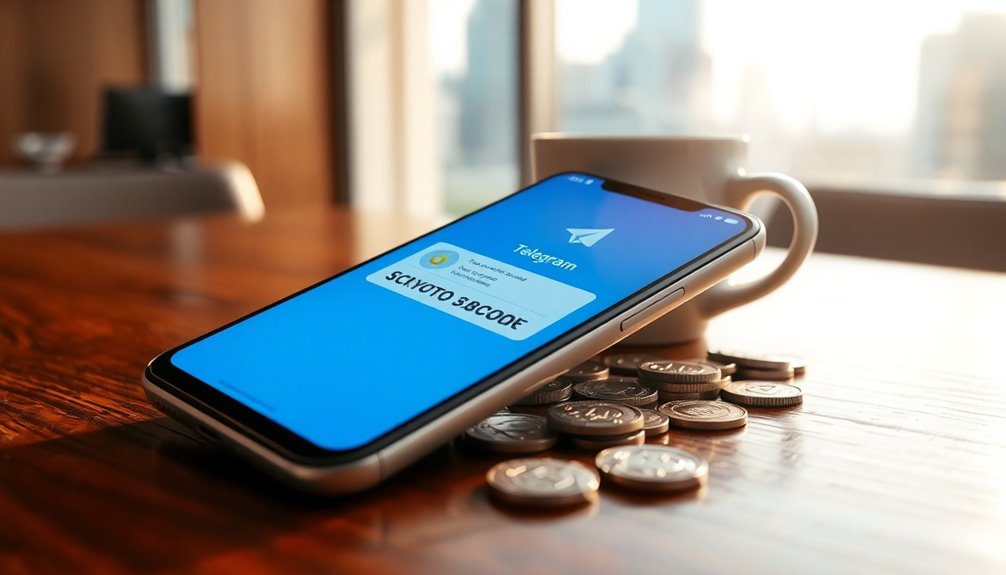
Telegram's latest update brings a host of exciting features and enhancements that make it easier than ever to engage with the cryptocurrency world.
You can now buy "Telegram Stars" directly in the app or via the Fragment website, linking your TON wallet for seamless transactions. These stars can be upgraded into unique NFTs, which you can trade across compatible blockchains.
The new third-party verification helps you identify genuine accounts, reducing scams and misinformation. Plus, with emoji reactions and improved search filters, your chats become more interactive. This update includes enhanced credibility through verified profiles, which boosts user trust and safety.
Personalize your gifts with custom backgrounds before minting them as NFTs, and enjoy the added utility of Toncoin (TON) with seamless peer-to-peer transfers.
This update truly elevates your Telegram experience in the crypto space.
Future of Crypto on Telegram

The future of crypto on Telegram looks promising, as it continues to integrate innovative features that bridge the gap between messaging and digital assets.
With over 800 million users now accessing Telegram's crypto wallet, you can expect seamless transactions using TON and stablecoins like USDT. As the platform evolves, it's crucial for users to embrace digital asset management, which will enhance their ability to track and optimize their investments.
The introduction of NFT gifting and the ability to convert gifts into NFTs enhances user engagement and trading opportunities. Furthermore, the platform's new third-party verification feature aims to enhance trust and reduce misinformation, fostering a safer environment for crypto transactions.
Additionally, the @Wallet bot provides fee-free transactions, making it easier for you to manage your assets.
As Telegram supports large crypto communities and real-time market updates, it's set to drive mainstream blockchain adoption. With ongoing development and anticipated new applications, Telegram could become a leading platform for crypto transactions and interactions.
Frequently Asked Questions
How Do I Set up a Crypto Wallet on Telegram?
To set up a crypto wallet on Telegram, start by downloading the app and creating an account if you haven't already.
Make sure your app's updated.
Search for the 'Wallet' option in the chat bar, then begin a conversation with the Telegram Wallet bot.
Click 'Start' and follow the prompts to create your wallet.
Don't forget to securely store your recovery phrase and set up two-factor authentication for added security.
Are There Transaction Fees for Using Crypto Features?
Yes, there are transaction fees associated with using crypto features on Telegram. You won't pay fees for deposits, but minimum amounts apply.
Withdrawals have minimum limits too, and while transferring between wallets, fees are similar to external withdrawals.
Converting crypto through the Telegram Wallet is free, but there are minimum amounts.
Keep in mind that network congestion can affect fees, especially for BTC and TON transactions. Always check the specific terms before proceeding.
Can I Send Crypto to Non-Telegram Users?
You can't send crypto to non-Telegram users.
The platform's crypto payment feature is limited to transactions between Telegram users only.
If you're looking to transfer Toncoin, both you and the recipient need to be on the app.
There isn't any functionality for sending crypto to external wallets or users outside the Telegram ecosystem.
What Cryptocurrencies Are Supported on Telegram?
You'll find that Telegram supports several cryptocurrencies, including HOT Coin, TON, Solana, NEAR, and BSC (Binance Smart Chain).
This variety lets you engage in diverse transactions directly within the app. The integration of wallet bots and payment links simplifies sending and receiving these cryptocurrencies.
Plus, with ongoing community support and security measures, you can confidently manage your crypto activities right from your Telegram experience.
How Secure Are My Crypto Transactions on Telegram?
Your crypto transactions on Telegram aren't as secure as you might think.
Since standard chats lack end-to-end encryption, your financial instructions could be exposed.
By using bots, you often have to share private keys, risking them being compromised.
The encryption protocols haven't been thoroughly tested, which raises further concerns.
Always remember that convenience can come with significant liabilities, so be cautious and stay informed about the risks involved.
Conclusion
In conclusion, Telegram's new crypto features offer exciting opportunities for you, whether you're trading, gifting NFTs, or using crypto trading bots. As you navigate this evolving landscape, stay informed about the regulatory challenges that may affect your experience. The integration with the TON blockchain could enhance your engagement, making crypto more accessible than ever. Embrace these changes and explore how they can enrich your interactions on Telegram, paving the way for a vibrant crypto community.
Thorsten has been immersed in the cryptocurrency world for several years. His early experiences as a miner and active market participant have given him first-hand knowledge of the industry’s highs and lows. Thorsten’s approach is grounded in transparency and honesty, ensuring our editorial direction remains authentic, accurate, and reader-focused.
-

 Crypto News1 week ago
Crypto News1 week agoArthur Hayes Warns of Potential ‘Harrowing Dump’ in Crypto During Trump’s Inauguration
-

 Memecoins and Altcoins6 days ago
Memecoins and Altcoins6 days ago2024’s Meme Token Wave: $PEPE, $MEME Lead Market Evolution
-

 Memecoins and Altcoins5 days ago
Memecoins and Altcoins5 days agoPEPE and Four Other Frog Meme Coins Leaping Towards Kekius Maximus
-

 BitCoin5 days ago
BitCoin5 days agoTrump’s Bitcoin Endorsement: a Catalyst for Global Adoption With Japan and Others Poised to Follow, Says Metaplanet CEO
-

 Memecoins and Altcoins5 days ago
Memecoins and Altcoins5 days agoUnlocking Safe Investment Paths: How the Meme Index Revolutionizes Meme Coin Investing
-

 Crypto News2 weeks ago
Crypto News2 weeks agoKim Kardashian’s Billion-Dollar Empire—The Reality Mogul’s Hidden Fortune
-

 Memecoins and Altcoins2 weeks ago
Memecoins and Altcoins2 weeks ago0.15 Dogecoin Alternative Expected to Mirror DOGE’s 2021 Surge and Reach Double-Digit Prices in Three Months
-

 BitCoin2 weeks ago
BitCoin2 weeks agoNebula Stride: A Sub-$0.02 Banking Alternative Set for 1000% Growth



















